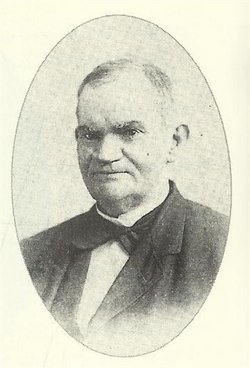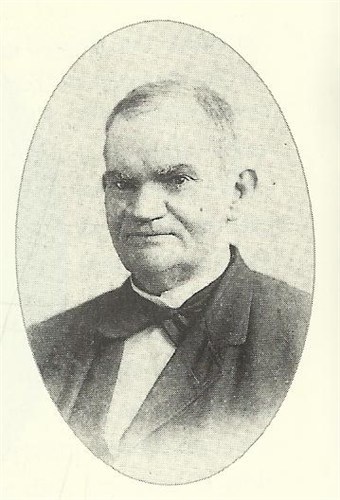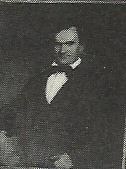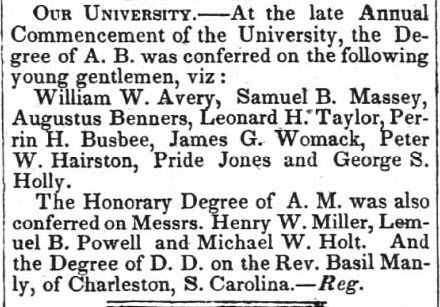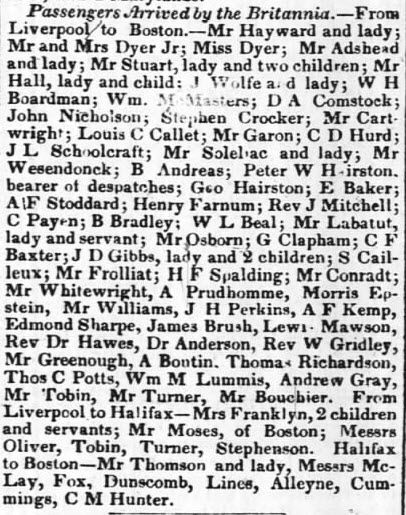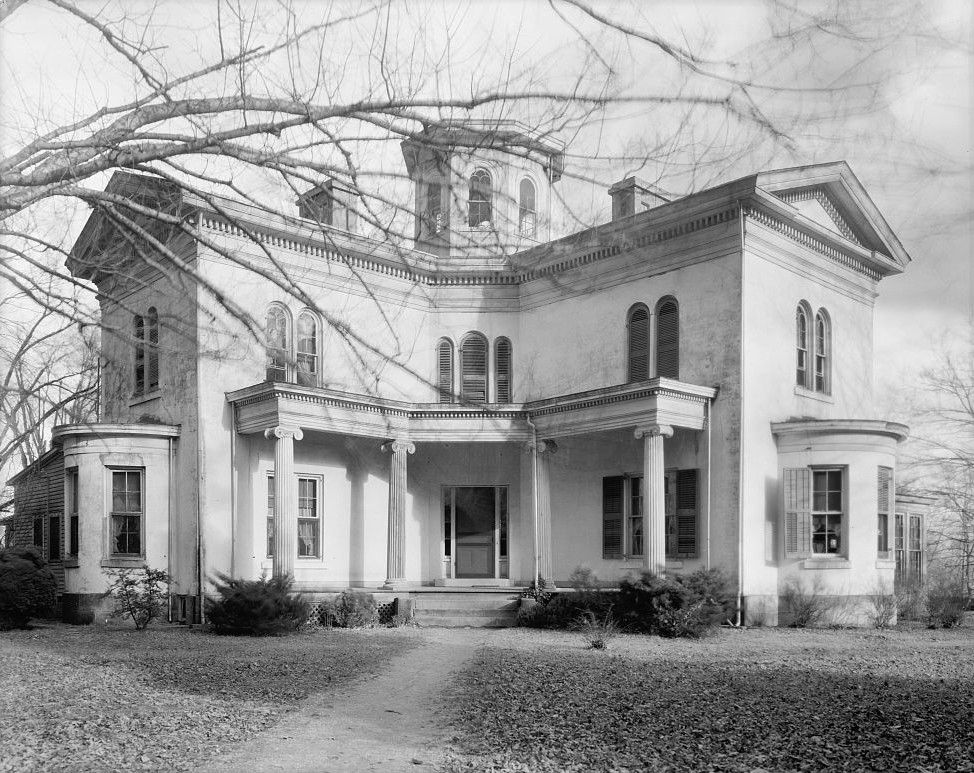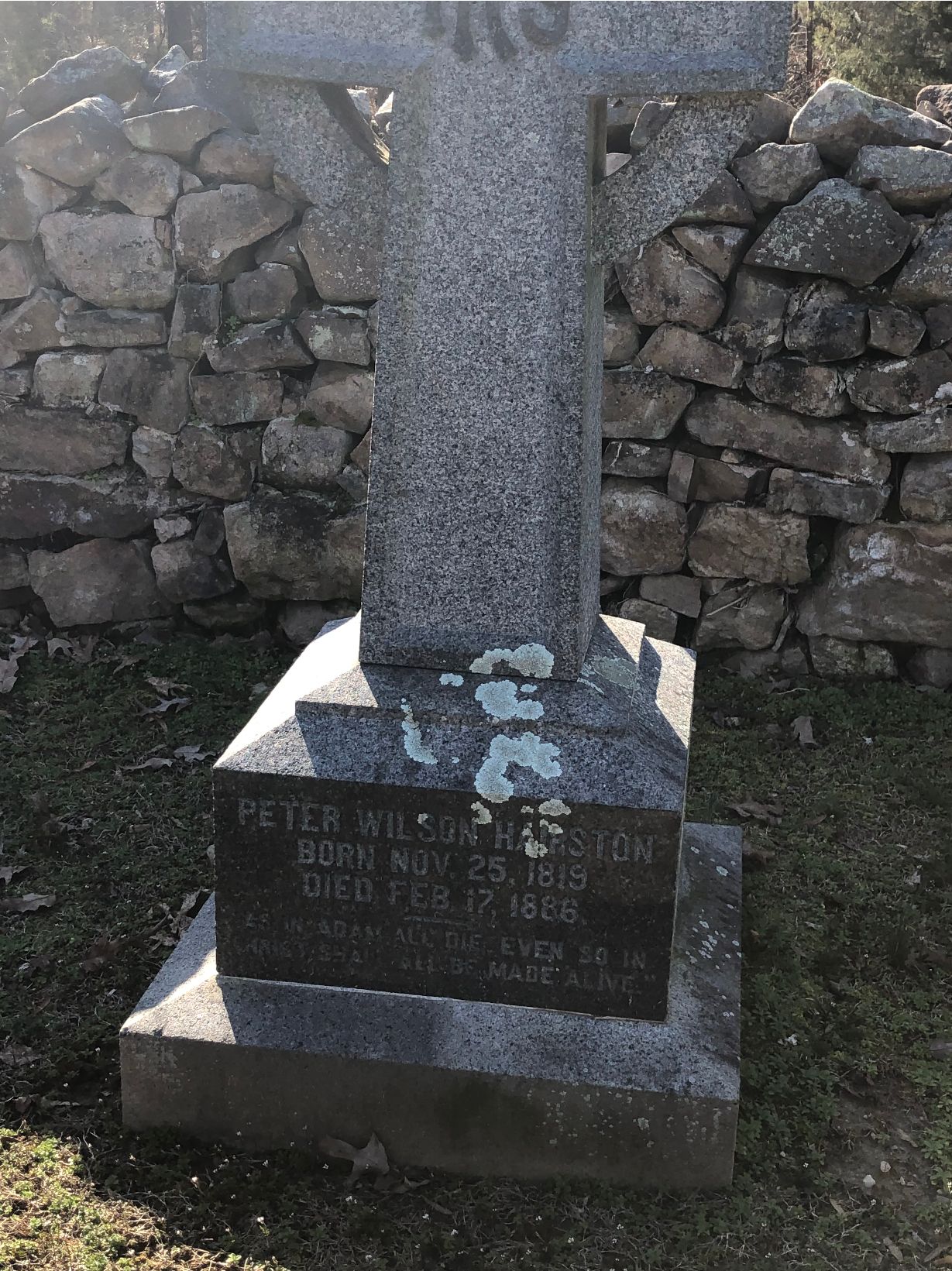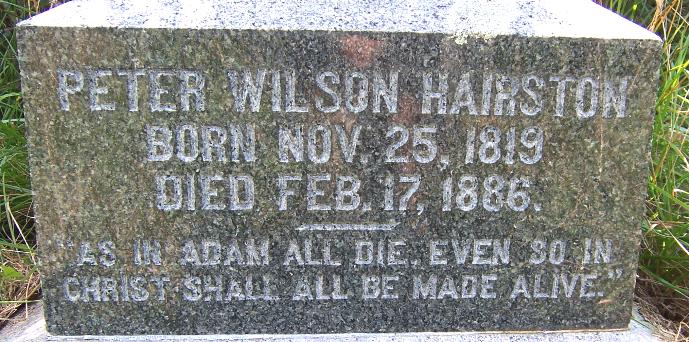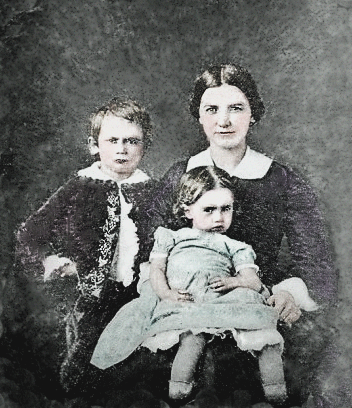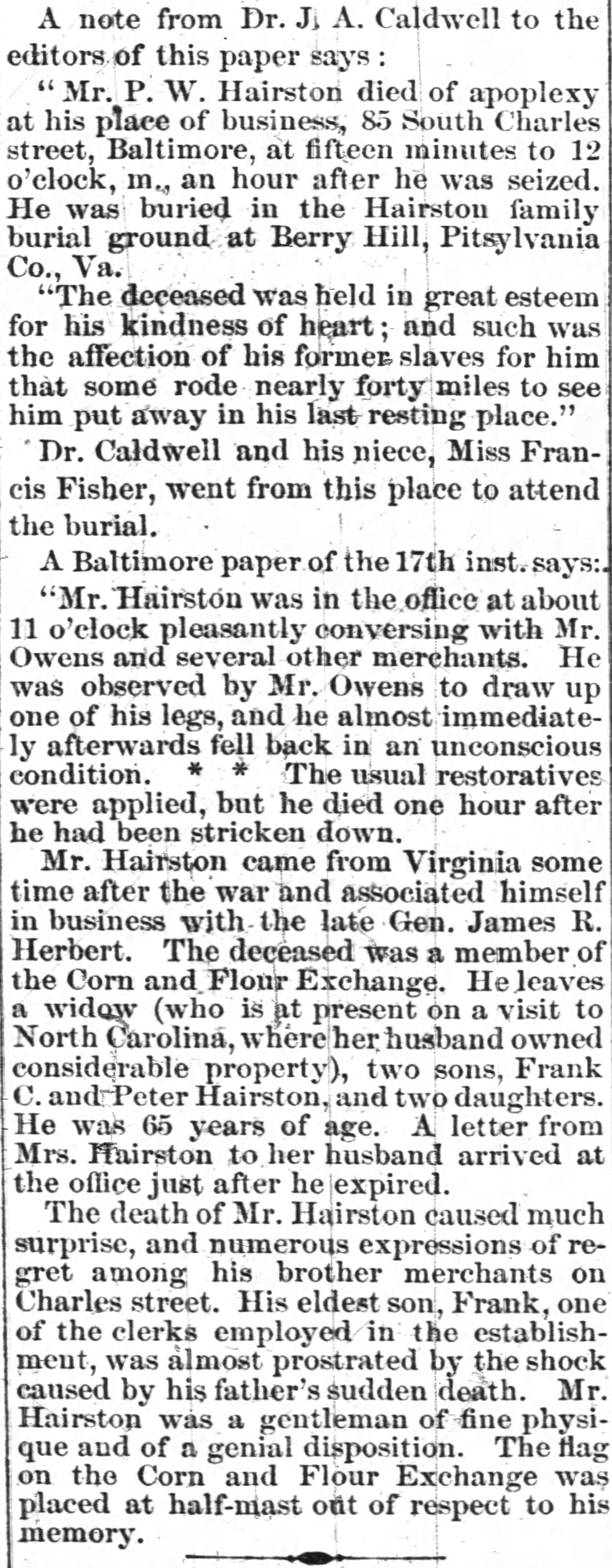He was born in Pittsylvania County, Va. His father was Samuel Hairston, cited by Clement Eaton as one of the most prolific enslavers in the South. Agnes John Peter Wilson, a granddaughter of Peter Hairston, Revolutionary captain and four-term North Carolina state senator, was his mother. He attended the plantation school at his father's Oak Hill, Va., residence and the Bingham School in Hillsborough, N.C.; he was graduated from The University of North Carolina in 1837. It is typical of his later foresight that his graduation oration was addressed to "The Future Prospects of Our Country." Afterward he attended the University of Virginia Law School but found it not to his taste and withdrew before graduation.
In 1832 he received, by devise, from his great-grandfather the Cooleemee Plantation of 2,300 acres in Davie and Davidson counties, N.C., and, though only thirteen years old, took charge of its management. During his college years he continued to travel there and handle management problems. After leaving law school, Hairston began to assume other family responsibilities, including travel to Europe in 1842 in the hope of finding a cure for the illness of his younger brother George. His diary (unpublished) gives a detailed description of his journey and what he saw. He returned at the end of two years and became deeply engrossed in the management of the family estates. In 1849 he married Columbia Lafayette Stuart, a sister of James Ewell Brown ("Jeb") Stuart (the Confederate major general who commanded the cavalry of the Army of Northern Virginia).
Hairston's enslaved people increased crop production at Cooleemee, shipping tobacco, hogs, and cotton as far away as Petersburg, Va. The number of enslaved people on the plantation grew to 300. Between 1853 and 1855 he built the present plantation house, an Anglo-Grecian villa with a double spiral staircase, which stands today as an outstanding example of late Greek Revival architecture. At the time, the building of this house was a mammoth undertaking in Piedmont North Carolina.
As a director of the Yadkin River Navigation Company, Hairston participated in its effort to make that river navigable to the sea. The attempt was only partially successful.
In 1857 Columbia died, and in 1859 Hairston married Fanny M. Caldwell, daughter of Davie Franklin Caldwell, a Superior Court judge and bank director. The couple spent their honeymoon in Europe, returning just before the outbreak of the Civil War. The bridegroom immediately became a volunteer aide on Stuart's staff but soon found that family business required his presence at home. After a short stay, he joined the staff of General Jubal A. Early. Hairston's younger brother had died, his father was senile, and his grandmother was over seventy-five. The responsibility of looking after the combined estates, which involved managing the work of 4,000 enslaved people and thousands of acres during wartime, required many trips home from the front.
At the end of the war, the people formerly enslaved by Hairston remained on his property as hired help to till the soil of the plantation while he moved to Baltimore, Maryland, and carried on a business as a grain and fertilizer merchant until his death.
By his first wife Hairston had three children: Samuel, Betty, and Archibald. All of them died before coming of age. By his second marriage he had four children: Agnes W. (1861–1914); Frank Caldwell (1865–1902), sometime North Carolina senator; Ruth Wilson (1868–1947); and Peter Wilson, Jr. (1871–1943).
(https://www.ncpedia.org/biography/hairston-peter-wilson)
------------------------------------OBITUARY----------------------------------------
Peter Wilson Hairston died suddenly at Baltimore Thursday 17th inst, and was buried on Saturday following at Oak Hill, Pittsylvania Co., Va., where he was born in the year 1819. He was the son of Samuel Hairston, and grandson of Peter Hairston who was one of the early settlers in this county. His great grand-father on his maternal side was Peter Perkins, who was early associated with James Taylor in making iron in this county, as he had done before at the "Troublesome Iron Works" in Guilford county, and who received a grant, from George III, to an estate, Bury Hill, in Pittsylvania Co., Va, the title to which is now in possession of the family.
He was educated at the University of Virginia and was sometime on Gen. Stuart's staff during the war between the States. After the war he associated himself with others in establishing the commission house of Herbert, Hairston & Co., Baltimore, since which time it had been his custom to spend a portion of cash year, with his household, at Baltimore, and at Sauratown his residence in this county; in this way contrasting the busy and varied scenes of city life with the seclusion of an isolated retreat— where he dispensed ?????? of which was only measured by the openness of his heart.
He was twice married, first to Miss. Stuart of Henry Co., Va., after to Miss Fanny, daughter of Judge Caldwell, by whom he had issue four children.
The pen of this writer does not attempt, in this brief announcement, to trace his tastes, sympathies, and temperament ; nor to characterize, a man, whose life, was duly appreciated and recognized by the judgement of his associates.
Though a regular attendant at the services of the Episcopal Church, it is not known to the writer that he was a member of the Church. Indeed the language of America's first orater, Edward Everett, would, to our mind, aptly illustrate his religious feelings. "ln like maner, the stream of practical piety flowed through the heart and conduct of our departed friend, but the fleecy clouds of silent reverence hover over the current, and a firm and rational aith was principally manifested not in sectarian professions, bat in a chastened temper, & pure conversation, and an upright life."
The spirit of one who possessed much geniality of manner and grace of mind has passed from earth.
(Transcribed from The Danbury Reporter, 25 Feb 1886, Page 3.)
Contributor: S. M. (51378526)
He was born in Pittsylvania County, Va. His father was Samuel Hairston, cited by Clement Eaton as one of the most prolific enslavers in the South. Agnes John Peter Wilson, a granddaughter of Peter Hairston, Revolutionary captain and four-term North Carolina state senator, was his mother. He attended the plantation school at his father's Oak Hill, Va., residence and the Bingham School in Hillsborough, N.C.; he was graduated from The University of North Carolina in 1837. It is typical of his later foresight that his graduation oration was addressed to "The Future Prospects of Our Country." Afterward he attended the University of Virginia Law School but found it not to his taste and withdrew before graduation.
In 1832 he received, by devise, from his great-grandfather the Cooleemee Plantation of 2,300 acres in Davie and Davidson counties, N.C., and, though only thirteen years old, took charge of its management. During his college years he continued to travel there and handle management problems. After leaving law school, Hairston began to assume other family responsibilities, including travel to Europe in 1842 in the hope of finding a cure for the illness of his younger brother George. His diary (unpublished) gives a detailed description of his journey and what he saw. He returned at the end of two years and became deeply engrossed in the management of the family estates. In 1849 he married Columbia Lafayette Stuart, a sister of James Ewell Brown ("Jeb") Stuart (the Confederate major general who commanded the cavalry of the Army of Northern Virginia).
Hairston's enslaved people increased crop production at Cooleemee, shipping tobacco, hogs, and cotton as far away as Petersburg, Va. The number of enslaved people on the plantation grew to 300. Between 1853 and 1855 he built the present plantation house, an Anglo-Grecian villa with a double spiral staircase, which stands today as an outstanding example of late Greek Revival architecture. At the time, the building of this house was a mammoth undertaking in Piedmont North Carolina.
As a director of the Yadkin River Navigation Company, Hairston participated in its effort to make that river navigable to the sea. The attempt was only partially successful.
In 1857 Columbia died, and in 1859 Hairston married Fanny M. Caldwell, daughter of Davie Franklin Caldwell, a Superior Court judge and bank director. The couple spent their honeymoon in Europe, returning just before the outbreak of the Civil War. The bridegroom immediately became a volunteer aide on Stuart's staff but soon found that family business required his presence at home. After a short stay, he joined the staff of General Jubal A. Early. Hairston's younger brother had died, his father was senile, and his grandmother was over seventy-five. The responsibility of looking after the combined estates, which involved managing the work of 4,000 enslaved people and thousands of acres during wartime, required many trips home from the front.
At the end of the war, the people formerly enslaved by Hairston remained on his property as hired help to till the soil of the plantation while he moved to Baltimore, Maryland, and carried on a business as a grain and fertilizer merchant until his death.
By his first wife Hairston had three children: Samuel, Betty, and Archibald. All of them died before coming of age. By his second marriage he had four children: Agnes W. (1861–1914); Frank Caldwell (1865–1902), sometime North Carolina senator; Ruth Wilson (1868–1947); and Peter Wilson, Jr. (1871–1943).
(https://www.ncpedia.org/biography/hairston-peter-wilson)
------------------------------------OBITUARY----------------------------------------
Peter Wilson Hairston died suddenly at Baltimore Thursday 17th inst, and was buried on Saturday following at Oak Hill, Pittsylvania Co., Va., where he was born in the year 1819. He was the son of Samuel Hairston, and grandson of Peter Hairston who was one of the early settlers in this county. His great grand-father on his maternal side was Peter Perkins, who was early associated with James Taylor in making iron in this county, as he had done before at the "Troublesome Iron Works" in Guilford county, and who received a grant, from George III, to an estate, Bury Hill, in Pittsylvania Co., Va, the title to which is now in possession of the family.
He was educated at the University of Virginia and was sometime on Gen. Stuart's staff during the war between the States. After the war he associated himself with others in establishing the commission house of Herbert, Hairston & Co., Baltimore, since which time it had been his custom to spend a portion of cash year, with his household, at Baltimore, and at Sauratown his residence in this county; in this way contrasting the busy and varied scenes of city life with the seclusion of an isolated retreat— where he dispensed ?????? of which was only measured by the openness of his heart.
He was twice married, first to Miss. Stuart of Henry Co., Va., after to Miss Fanny, daughter of Judge Caldwell, by whom he had issue four children.
The pen of this writer does not attempt, in this brief announcement, to trace his tastes, sympathies, and temperament ; nor to characterize, a man, whose life, was duly appreciated and recognized by the judgement of his associates.
Though a regular attendant at the services of the Episcopal Church, it is not known to the writer that he was a member of the Church. Indeed the language of America's first orater, Edward Everett, would, to our mind, aptly illustrate his religious feelings. "ln like maner, the stream of practical piety flowed through the heart and conduct of our departed friend, but the fleecy clouds of silent reverence hover over the current, and a firm and rational aith was principally manifested not in sectarian professions, bat in a chastened temper, & pure conversation, and an upright life."
The spirit of one who possessed much geniality of manner and grace of mind has passed from earth.
(Transcribed from The Danbury Reporter, 25 Feb 1886, Page 3.)
Contributor: S. M. (51378526)
Family Members
Advertisement
Records on Ancestry
Advertisement
